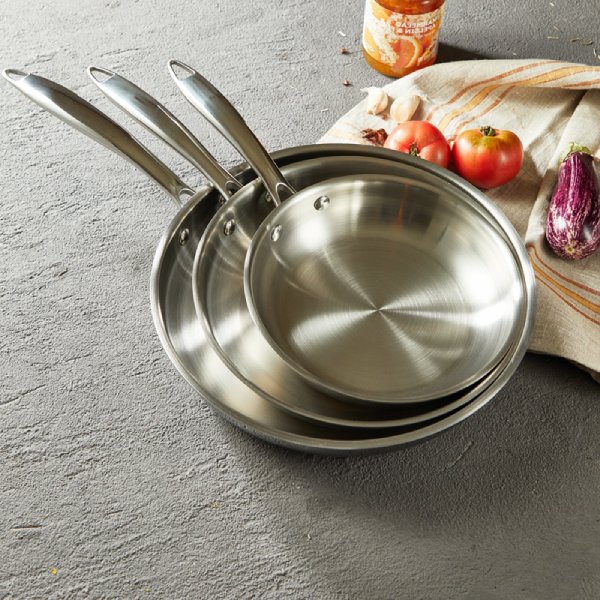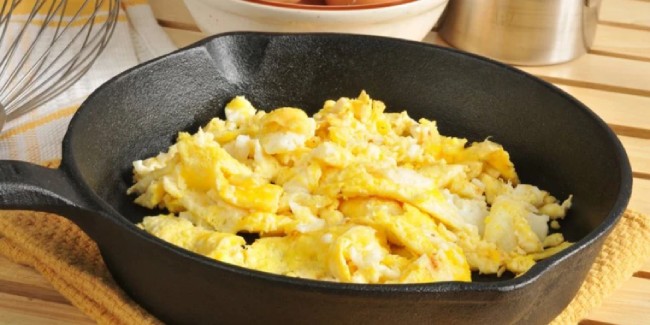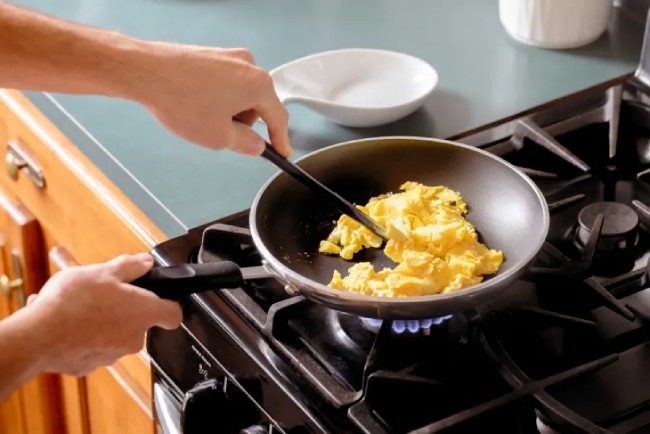What Is The Best Pan For Eggs On A Gas Stove? Trying to make sense of the myriad cookware options can take time and effort. As someone who has grappled with this issue, I delved deep into the subject matter to aid your search. An essential element to watch is the non-stick coating, among other crucial factors, to ensure a flawless cooking journey.
This piece aims to illuminate different aspects such as the material, size, and more for you to identify your perfect pan. In addition, we will spotlight some of the highest-rated pans that will make your egg recipes shine. So, ready to kickstart your journey towards making breakfast preparations effortless?
Factors to Consider When Choosing a Pan for Eggs on a Gas Stove
When selecting a pan for cooking eggs on a gas stove, it is essential to consider the material, size, non-stick coating, and heat conductivity.
Material
Choosing the best material for your egg pan is crucial. In stores or online, you’ll find various options. Examples of commonly used materials for cookware include cast iron, stainless steel, and aluminum. Each has pros and cons that can significantly influence your cooking experience on the gas stove.
For example, many professional chefs celebrate cast iron pans for their superb heat-retention abilities; however, they may take longer to heat up than other materials. Stainless steel pans offer excellent durability and resistance to rust or staining but can struggle with even heat distribution causing pesky hot spots.
Meanwhile, aluminum is an incredible conductor of heat, allowing quick and uniform cooking, which makes it perfect for efficiently managing high temperatures while frying eggs on a gas stove although an extra non-stick coating might be needed to prevent stickiness depending on the type of finish used during manufacturing.
So when choosing a pan material that best suits you, consider factors like ease of cleanup, conductivity level preferences, and pan durability.

Size
When in search for the ideal egg pan, size becomes a critical factor to consider. It plays a pivotal role in determining the number of eggs you can cook simultaneously and ultimately affects the outcome of your cooking.
Whether you prefer fluffy omelets or cooking multiple eggs simultaneously, size matters significantly. Let’s say you are preparing breakfast for a large family or hosting brunch with friends – using larger pans allows accommodating more servings, ensuring no one goes hungry.
On the flip side, if it’s just two of us and we need a quick scrambled egg breakfast before hitting the gym or office, smaller pans come into play nicely. They’re compact, easy to handle, and perfect for whipping up individual portions like fried eggs or little omelets.
Understanding how much useable cooking surface your chosen pan offers provides flexibility in your culinary endeavors and helps tailor your selection according to the frequency of usage and serving sizes.
Non-stick Coating
The non-stick coating is undeniably an essential feature in a pan for cooking eggs on a gas stove. When applied correctly, this coating type creates a barrier between your food and the pan surface, thereby preventing sticking or burning.
In our review process with 16 different non-stick skillets, we found that models like Tramontina’s 10-Inch Professional Pan deliver outstanding performance due to their slick and durable non-stick surfaces.
More importantly, they make post-meal cleanup a breeze! It’s worth noting that there are also plans with non-toxic coatings for health-conscious individuals who want to prevent potential chemical exposure during cooking.
So when you’re hunting for an egg-cooking companion, prioritize versions boasting high-quality non-stick coatings to revolutionize your breakfast experience!
Heat Conductivity
Choosing a pan with high heat conductivity is essential when cooking eggs on a gas stove. Heat conductivity refers to how well and quickly a material can absorb and transfer heat. The thermal conductivity of different materials directly influences the cooking process, as it determines how efficiently heat is transferred.
For example, hard-anodized pans with an aluminum exterior are known for their rapid heat conductivity, ensuring that your eggs cook evenly and efficiently. Conversely, stainless steel or cast iron cookware may necessitate extended preheating durations to reach the intended temperature.
Selecting a pan with excellent heat conductivity ensures that your eggs cook consistently without hot spots or sticking issues.
Best Pan Options for Cooking Eggs on a Gas Stove
I am looking for the best pan to cook eggs on a gas stove. Check out our top recommendations for perfect eggs every time!
Cast Iron Skillet
I love cooking eggs on a gas stove with a trusty cast iron skillet. Cast iron pans, like the Lodge Seasoned Cast Iron Skillet, are renowned for their superb heat retention and distribution.
This means your eggs will cook evenly without any hot spots, resulting in perfectly cooked breakfast delights every time. Plus, cast iron skillets offer excellent versatility; you can fry eggs to perfection and sear steaks and even bake delicious desserts in the oven with these durable pans.
The Lodge Seasoned Cast Iron Skillet features a good-sized cooking area with a short handle and a helper handle for easy maneuvering. With its smooth surface and remarkable heat conductivity, this pan is undoubtedly one of the best options when it comes to frying up some fluffy scrambled or sunny-side-up eggs on your gas stove.
Stainless Steel Pan
I suggest using a stainless steel pan for cooking eggs on a gas stove. It offers excellent durability, even heat distribution, and easy maintenance, making it an ideal choice for achieving deliciously boiled eggs. Stainless steel pans, such as the All-Clad D3 Stainless Steel French Skillet, are renowned for their durability and heat distribution properties.
They offer a sturdy and long-lasting option for frying your favorite breakfast dishes. With its scratch-resistant surface, a stainless steel pan can withstand regular use without losing quality.
It’s also worth noting that stainless steel cookware is considered safe and non-toxic, making it an excellent choice for preparing food. So if you’re looking for a reliable and versatile pan to cook perfect eggs on your gas stove, a stainless steel option like the All-Clad D3 Stainless Steel French Skillet is worth considering.
Output: I highly recommend using a stainless steel pan like the All-Clad D3 Stainless Steel French Skillet for cooking eggs on your gas stove. Its durability, efficient heat distribution, and scratch-resistant surface make it an ideal choice when frying up delicious breakfast meals.
Ceramic Non-stick Pan
A ceramic non-stick pan is one of the best pan options for cooking eggs on a gas stove. Ceramic pans have gained popularity for their durability and excellent heat distribution, making them an ideal choice for cooking eggs evenly.
The non-stick coating on ceramic pans makes it easy to cook eggs without worrying about them sticking or burning. GreenPan’s ceramic non-stick coating particularly stands out, as it comes highly recommended by users and reviewers alike.
Furthermore, these pans are easy to clean after use, saving you time and effort in the kitchen. With their high-temperature resistance and durable construction, non-stick ceramic pans are a fantastic choice for breakfast enthusiasts who frequently cook eggs.

Benefits of Using the Right Pan for Eggs on a Gas Stove
Using the right pan for eggs on a gas stove offers even heat distribution, easy cleaning, and prevents sticking and burning.
Even heat distribution
When selecting a pan for cooking eggs on a gas stove, it is crucial to prioritize its capability to distribute heat evenly. This factor plays a significant role in achieving the desired cooking results. This ensures that each egg cooks at the same rate, preventing some from being overcooked while others remain undercooked.
Even heat distribution is essential when cooking multiple eggs at once or achieving consistent results with different egg dishes. It allows for better control and reduces the risk of burning or sticking.
Pans with materials like stainless steel, cast iron, or carbon steel are known for their excellent heat conductivity. They can help achieve this even heat distribution throughout the pan’s surface.
Easy cleaning
Easy cleaning is a crucial factor to consider when cooking eggs on a gas stove. People want to save time scrubbing off stuck-on egg residue from their pans. That’s why finding the right pan that offers effortless cleanup is essential.
The top-rated egg pans for 2023 deliver not only excellent cooking performance but also feature durable non-stick surfaces that make cleaning a breeze. With sturdy cool-touch, slip-free handles, and excellent maneuverability, these pans ensure that your eggs slide off effortlessly without leaving behind any stubborn stains.
So, say goodbye to hours spent at the sink and hello to hassle-free mornings with the perfect pan for easy cleaning when cooking eggs on a gas stove.
Prevents sticking and burning
Using the right pan for cooking eggs on a gas stove prevents sticking and helps avoid burning. When a pan is heated, the metal expands, creating microscopic cracks that can trap the egg and cause it to stick and burn.
This is why using a non-stick surface pan is crucial, as it prevents eggs from sticking to the bottom. Non-stick pans are coated to prevent food from sticking, making them ideal for cooking delicate items such as eggs.
Additionally, oil or butter in the pan can further reduce sticking and create a smooth cooking surface. Choosing the right pan with a non-stick coating ensures that your eggs cook evenly without fearing them getting stuck or burnt in the process.
Tips for Cooking Eggs on a Gas Stove
Preheat the pan before adding the eggs to ensure even cooking and prevent sticking.
Preheating the Pan
Preheating the pan is crucial when cooking eggs on a gas stove. This ensures that the pan is at the right temperature before adding oil or butter and helps prevent sticking. To preheat the pan, turn on the gas stove to medium heat and let it warm up for a few minutes.
You can check To check if the pan is hot enough, sprinkle a few drops of water onto its surface. If they sizzle and evaporate immediately, you know it’s ready. Preheating the pan helps with even heat distribution and reduces the chances of burnt eggs or unevenly cooked yolks.
So remember to give your pan some time to heat up before starting your egg-cooking adventure!
Using the Right Amount of Oil or Butter
To achieve the perfect balance of flavor and texture when cooking eggs on a gas stove, it’s important to use the right amount of oil or butter. Adding a small amount of oil or butter to the pan can help prevent sticking and enhance the overall taste of your eggs.
Butter adds richness and flavor, while oil is preferred by those who enjoy a runny yolk. You can opt for a non-stick cooking spray if you choose not to use butter. Additionally, water can create tender fried eggs with soft yolks.
Experimentation and personal preference significantly determine the ideal amount of oil or butter for your eggs. Be bold and try different methods once you find what works best.
Controlling the Heat
Controlling the heat is crucial when cooking eggs on a gas stove, as it can significantly affect the final result. Start with medium-low heat and adjust as needed to achieve perfectly cooked eggs.
High heat may cause the eggs to cook too quickly and become overcooked or rubbery, while low heat can result in undercooked or runny eggs. Pay attention to the flame size and make minor adjustments throughout the cooking process if necessary.
By carefully controlling the heat, you can create deliciously fluffy scrambled eggs or beautifully cooked sunny-side-up eggs every time. Remember, practice makes perfect!
Using a Lid for Steam Cooking
One trick I’ve discovered when cooking eggs on a gas stove is to use a lid for steam cooking. This method prevents the eggs from sticking to the pan and helps them cook evenly on all sides.
The eggs are steamed from both the top and bottom by placing a lid on top of the pan, creating a moist and fluffy texture. The steam helps cook the egg whites thoroughly, keeping the yolk slightly runny if desired.
It’s easy to achieve perfectly cooked eggs every time on your gas stove.
FAQs about What Is The Best Pan For Eggs On A Gas Stove?
What type of pan is best for cooking eggs on a gas stove?
A non-stick frying pan is the best choice for cooking eggs on a gas stove. The non-stick surface prevents the eggs from sticking and makes flipping or sliding them out of the pan easier.
Can I use a cast iron skillet to cook eggs on a gas stove?
While cast iron skillets are great for many types of cooking, there may be better options for cooking eggs on a gas stove. Cast iron pans retain heat very well, which can cause the eggs to overcook or stick to the surface.
Do I need a specific pan size for cooking eggs on a gas stove?
The pan size depends on how many eggs you plan to cook at once. For individual servings, an 8-inch or 10-inch frying pan should suffice. If you’re making multiple servings, opt for a larger-sized pan.
Are there any particular features or qualities I should look for in an egg pan for my gas stove?
When choosing an egg pan for your gas stove, look for one with good heat distribution and even heating properties. Additionally, ensure it has a comfortable handle and is easy to clean since egg residue can sometimes be stubborn to remove.
Conclusion on What Is The Best Pan For Eggs On A Gas Stove?
In conclusion, when cooking eggs on a gas stove, choosing the right pan is crucial for achieving delicious results. Material, size, non-stick coating, and heat conductivity should be considered.
The Zwilling Madura Plus 8-Inch pan is a top choice for its non-stick surface and easy cleaning, while the Caraway Fry Pan is the best overall option. Whether you prefer cast iron or stainless steel, excellent pans are available to suit your needs and create perfect eggs every time.
Read more:

